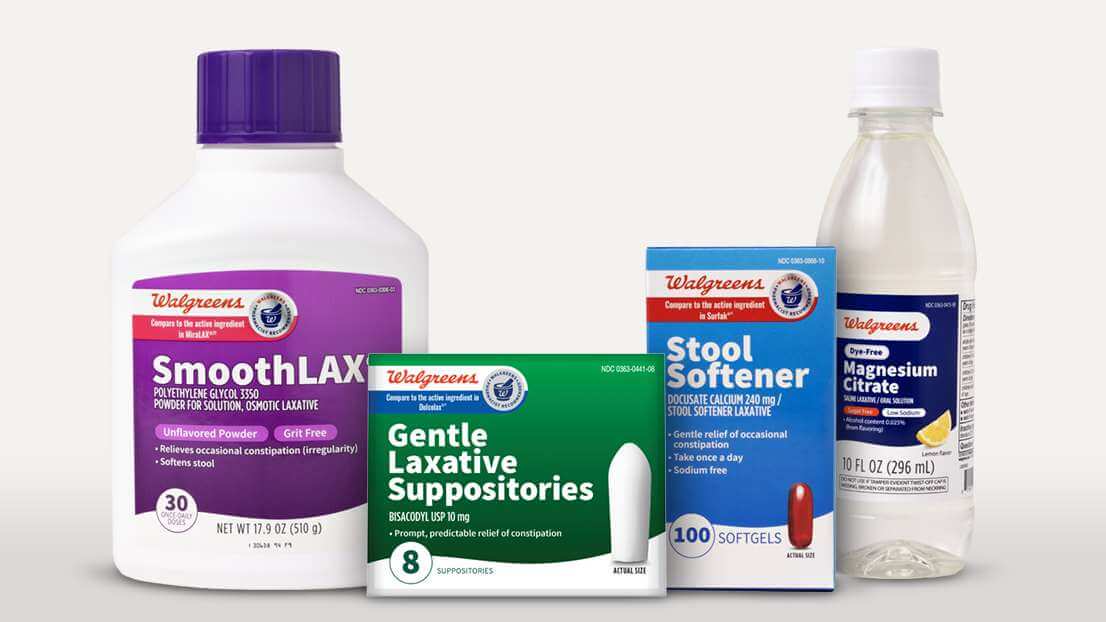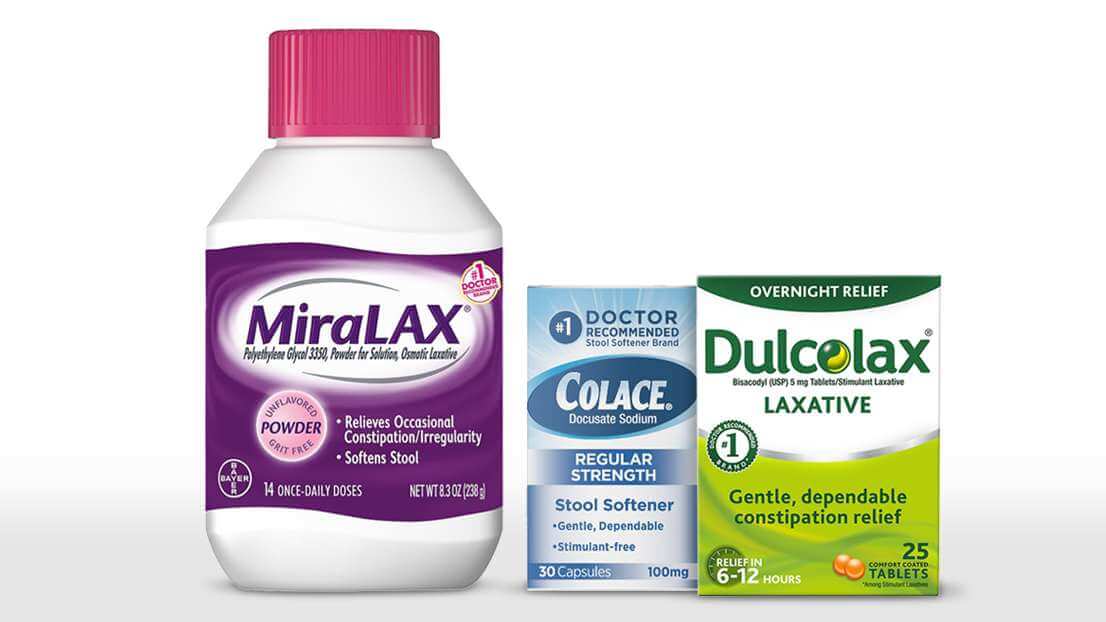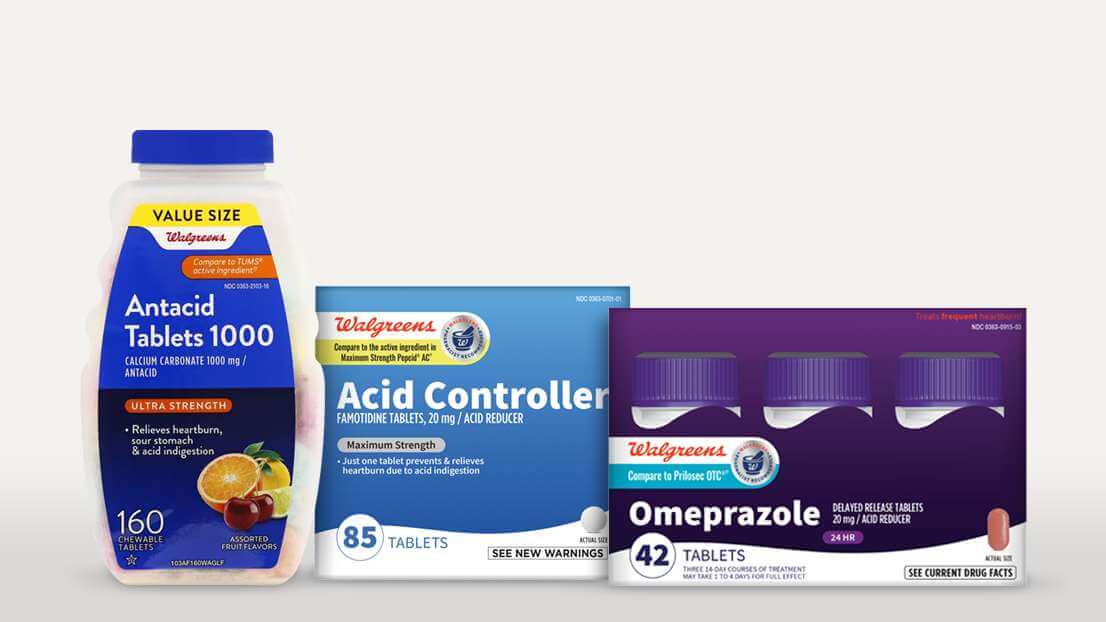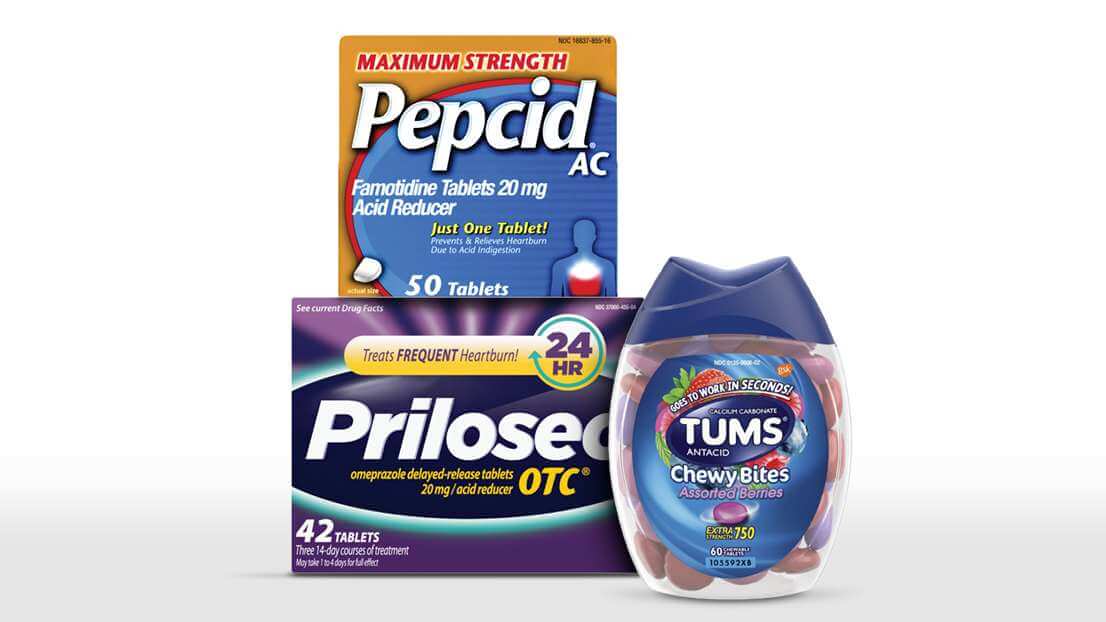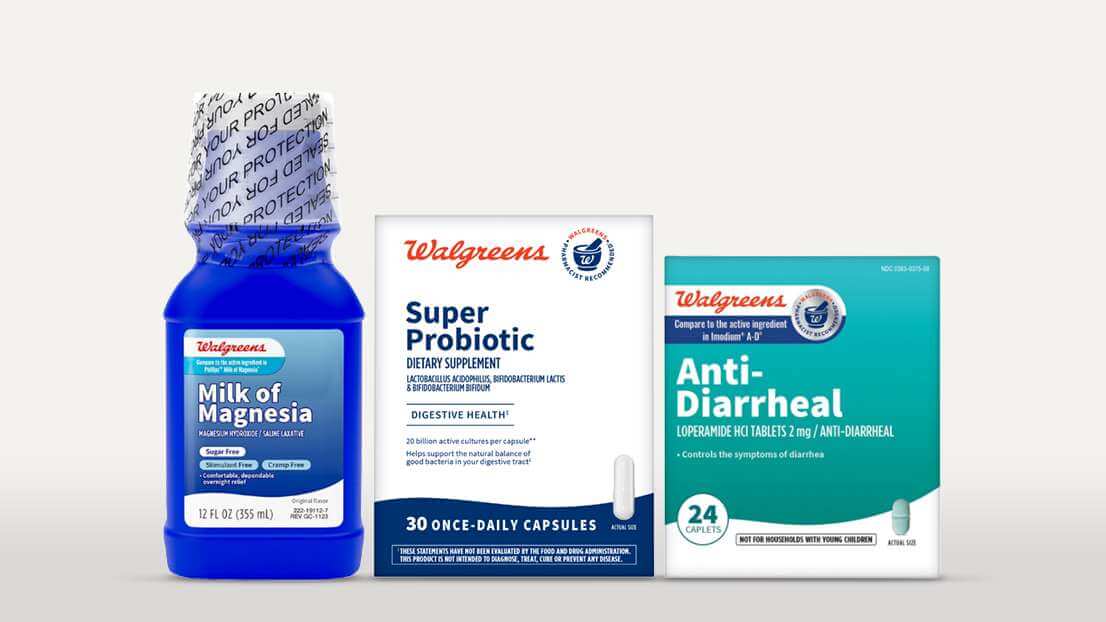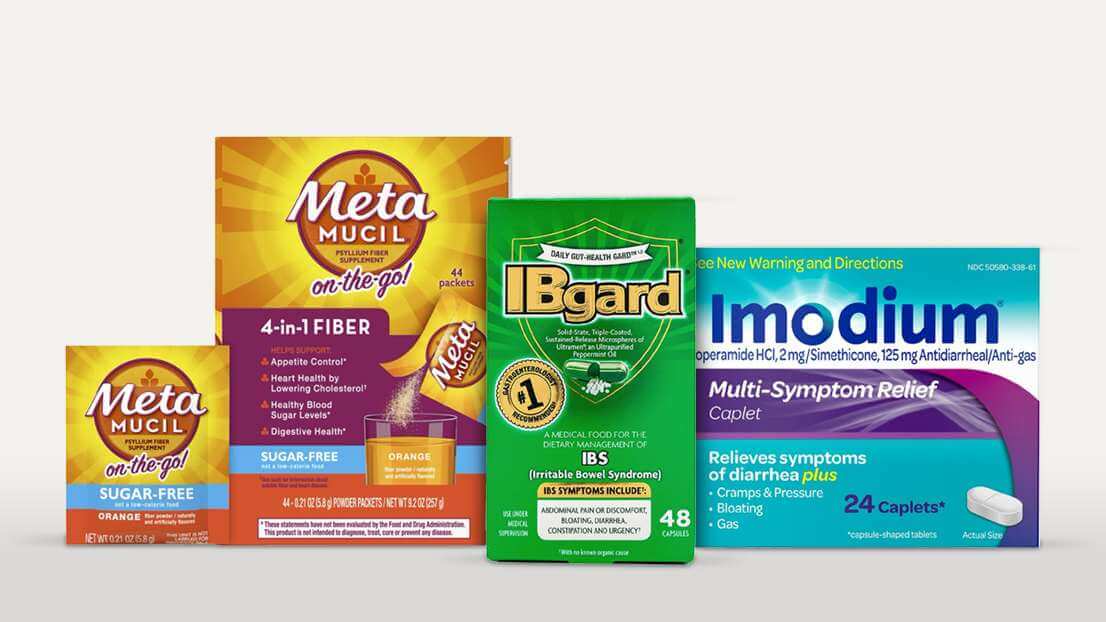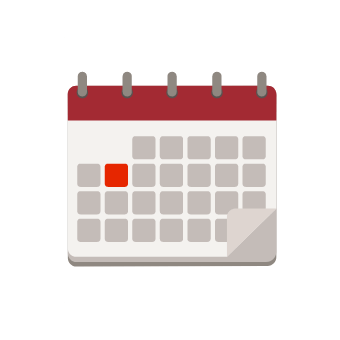Digestive health | Walgreens
Digestive health
We’re here to help you keep your digestive health on track with expert advice, in-store services and recommended solutions.
Expert care around the clock
Find a store to visit your local pharmacist today or get answers to your general health and medication questions with our 24/7 Pharmacy Chat support.

Constipation explained
What is constipation?
Constipation describes a condition in which an individual may be experiencing:
- Fewer than three bowel movements per week
- Stools that are hard, lumpy, dry and/or difficult or painful to pass
- A feeling that you are unable to empty your bowels completely
What are the causes of constipation?
Some of the most common causes of constipation include:
- Certain health and nutritional problems, such as not eating enough fiber, dehydration and not getting enough physical activity
- Daily and life changes, such as pregnancy, aging, traveling, ignoring the urge to have a bowel movement and changes to your diet
- Certain medicines and dietary supplements, like antacids that contain aluminum and calcium, anticonvulsants, diuretics, iron supplements, some anti-depressants and narcotic pain medicines
- Intestinal obstructions
- Stool moving too slowly through the digestive tract
- Other medical conditions, such as celiac disease, irritable bowel syndrome (IBS), disorders that impact your brain and spine, such as Parkinson’s disease and conditions that impact your metabolism or hormones, such as diabetes
How is constipation diagnosed?
Healthcare providers use your medical and family history, a physical exam and other medical exams to diagnose constipation. To prepare for the discussion with your doctor, it may be helpful to track your bowel movements and the appearance of your stools for multiple days or weeks prior to your visit.
Are there ways to treat constipation at home?
You may be able to treat your constipation at home by:
- Modifying your diet. Consume more foods high in fiber, such as fruit (especially prunes), cereals high in fiber, vegetables and whole grain breads. Drink plenty of fluids.
- Getting regular physical activity
- Trying bowel training techniques such as setting a regular convenient time for daily bowel movements to become more regular. Eating stimulates the bowel and therefore the best time to schedule a bowel movement is 20 to 40 minutes after a meal.
- Eliminating certain medications or supplements, under the supervision of your healthcare provider
- Utilizing a stool softener or a laxative for a short period of time, under the guidance of your healthcare provider
If at-home treatments don’t work, consult your healthcare provider to see if a prescription medicine is right for you or if alternative treatment options are available.
Help prevent constipation with lifestyle changes

Get enough fiber in your diet

Drink plenty of fluids

Get regular physical activity

Try to have a bowel movement at the same time each day

Navigating GERD
What is GERD?
Gastroesophageal reflux disease (GERD) is a severe and long-lasting condition in which your stomach contents repeatedly leak back into your esophagus (acid reflux). The acid reflux irritates the esophagus and causes symptoms that are bothersome and may lead to more serious complications down the road if left untreated.
What are the symptoms of GERD?
GERD often causes the following symptoms:
- Heartburn
- Regurgitation of food or liquid
- Pain in the chest
- Nausea or vomiting
- Pain or difficulty swallowing
- Ongoing coughing or hoarseness
What are some causes of GERD?
You may experience GERD if your lower esophageal sphincter is weakened or relaxes when it’s not supposed to. This may be caused by the following:
- Overweight or obesity
- Pregnancy
- Smoking or experiencing secondhand smoke
- You have a hiatal hernia, a condition in which the upper part of the stomach is able to move up into your chest because of an opening in your diaphragm.
- You take medications that may cause or worsen GERD symptoms, such as benzodiazepines, calcium channel blockers, some asthma medications, NSAIDs or tricyclic antidepressants.
How is GERD diagnosed?
Healthcare providers often diagnose GERD by understanding your symptoms and medical history, as well as recommending certain medical tests, such as an upper gastrointestinal (GI) endoscopy and/or esophageal pH monitoring.
Are there ways to manage GERD symptoms?
There are lifestyle modifications and medicines you can take to help you manage symptoms of GERD such as:
- Losing weight if you’re considered overweight or obese
- Propping up your head 6-8 inches off your bed while you sleep
- Quitting smoking
- Changing your diet or eating habits
- Decreasing your alcohol consumption
- Waiting a minimum of 2-3 hours after eating to lay down to sleep
- Avoiding tight-fitting clothing
- Over-the-counter and prescription medications, such as antacids, H2 blockers, proton pump inhibitors (PPIs)
If these changes and medications do not help manage your symptoms, your healthcare provider may also recommend additional prescription medications, surgery or other medical procedures.
When should I seek medical care from my healthcare provider for GERD symptoms?
See your healthcare provider if your symptoms are severe or frequent or require over-the-counter medications more than two times per week.
Some signs and symptoms may indicate a more serious problem and require immediate medical attention including:
- Pain or difficulty swallowing
- Loss of weight without trying or loss of appetite
- Chest pain
- A new stomach pain if you are age 60 or older
- Feeling like you are choking
- Persistent vomiting
- Signs of bleeding such as black stools, blood in the vomit or coffee grounds-like dark-colored vomit.
What are common GERD triggers?
Here’s what to avoid eating or drinking to help prevent or improve symptoms.

Acidic foods

Alcohol

Chocolate

Caffeine

Foods high in fat

Mint

Spicy foods

Eating large meals or eating late at night
Related articles

Is it IBS?
What is IBS?
Irritable bowel syndrome (IBS) is a chronic digestive system condition that causes recurrent attacks of abdominal pain, bloating, gas and changes in bowel movements. Individuals with IBS may have normal bowel movements on some days and abnormal bowel movements on others that consist of diarrhea, constipation or both. IBS is considered a disorder of the gut-brain interaction, in which the gut and brain do not work together properly.
What are the different types of IBS?
There are four types of IBS. Each type is determined by the primary stool consistency on days where there is at least one abnormal bowel movement.
- IBS with constipation (IBS-C) is defined as more than a fourth of your stools are hard or lumpy and less than a fourth of your stools are loose or watery.
- IBS with diarrhea (IBS-D) is defined as more than a fourth of your stools are loose or watery and less than a fourth of your stools are hard or lumpy.
- IBS with mixed bowel habits (IBS-M) is defined as more than a fourth of your stools are hard or lumpy and more than a fourth of your stools are loose or watery.
- IBS unclassified (IBS-U) is defined as IBS that does not have a significant pattern of abnormal stools and does not meet the criteria for IBS-C, IBS-D or IBS-M.
What are the most common symptoms of IBS?
The most common symptoms of IBS are:
- Pain in your gut or abdomen
- Changes in your bowel movements, such as diarrhea, constipation or both
- Bloating and gas
- Feeling like you’re unable to empty your bowels
- A white-like colored mucus in your stool
IBS symptoms can come and go so be sure to track your symptoms over time.
What are the causes of IBS?
While doctors can’t confirm exactly what causes IBS, experts think it may be a combination of factors that cause IBS, such as abnormal brain-gut interactions and certain problems like:
- Infections in your digestive tract that are bacterial
- Overgrowth of small intestinal bacteria
- Intolerances or sensitives to certain foods
- Genetics
- Some mental disorders, like depression or anxiety
- Traumatic events in your early life, like physical or sexual abuse
How is IBS diagnosed?
Healthcare providers will seek to understand your symptoms, medical and family history, and take a physical exam to diagnose IBS. To prepare for your visit, it may be helpful to track your bowel movements and the appearance of your stool for multiple days or weeks prior to your visit. Your doctor may also order tests, like blood or stool tests, to rule out other more serious health problems.
Are there ways to treat IBS?
Your healthcare provider may recommend these treatments depending on your symptoms.
Diet changes

Consume more fiber
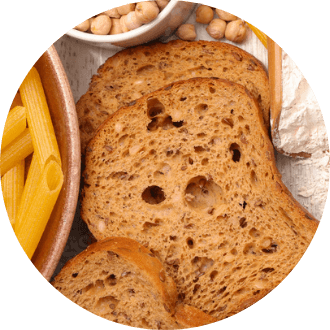
Avoid foods with gluten, like breads, pastas, cereals, baked goods, malts & beer

Eat 5-6 small meals per day instead of 3 large meals

Slow down when eating

Avoid beans, cabbage and foods that are difficult to digest
Other treatments

Medications (depending on the type of IBS you have)

Probiotics

Mental health therapies


